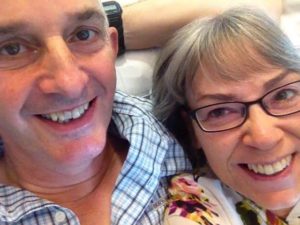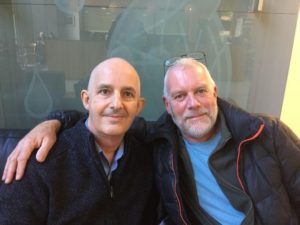

When David started to experience chest pains, blood cancer was the last thing on his mind.
David’s GP was able to reassure him that his pain wasn’t heart-related and did some blood tests which showed that David’s neutrophils were low – he recommended a re-test in a month’s time. David’s neutrophils were still low and the GP again recommended a re-check which showed a similar result. Eventually, David was referred to a specialist. Once David saw the specialist he was given the news that he had acute myeloid leukaemia (AML). As he explains: “When I got the initial blood results I had done some research online and thought I had chronic leukaemia – so when the specialist told me it was AML it wasn’t a total surprise. My wife Elaine was with me and it hit her harder than me. I asked the doctor how long I would have if I decided not to have treatment and he said “about three months” – that really shocked the family.”
 David and Elaine weighed up the pros and cons of treatment and decided it was a better option to proceed, he explains: “We looked at the percentage success rate and it was clearly a better option for me to go with treatment. The specialist said that the first two years after treatment were touch and go as lots of things could go wrong but if I got past that the chances of a longer life extended all the time.”
David and Elaine weighed up the pros and cons of treatment and decided it was a better option to proceed, he explains: “We looked at the percentage success rate and it was clearly a better option for me to go with treatment. The specialist said that the first two years after treatment were touch and go as lots of things could go wrong but if I got past that the chances of a longer life extended all the time.”
David’s treatment began a few days later in Wellington Hospital with his first round of chemotherapy. He spent most of the next three months in hospital with just a few days’ break between each round of treatment. As he explains: “I’d never been in hospital before so I didn’t know what to expect but I tried to keep a normal routine – I got up and dressed so I wasn’t in my pyjamas all day and got some exercise by walking up the stairs a few times each day.”
It wasn’t all plain sailing as David experienced adverse reactions to drugs, infection and, just after his first round of chemo, his wife Elaine became unwell with a brain lesion that doctors initially thought might be cancer: “Elaine was on Level 7 of the hospital and I was on Level 5 – thankfully Elaine is on the road to recovery now – but it was a really difficult time for the family.”
David has a strong, positive spirituality which helped him during his cancer, he explains: “My faith is important to me and the idea of my own death wasn’t so frightening because for me, death is not the end of life but more the end of a chapter, and a new chapter begins.”

David needed a stem cell transplant – thankfully his brother in the UK was a match and travelled over to New Zealand to be his donor. Things progressed well, and David’s transplant was a success – his cancer was put into remission. David has just started his third year in remission and reflects on his cancer journey: “It’s amazing to consider what has happened to my body and how the doctors have carefully navigated my cancer with all its possible pitfalls. I’m very grateful to be in my third year of remission with the possibility of more as my body continues to gradually regain strength. The things that were key in my journey were having a strong positive spirituality and the joy of having family close. Also the ability to eat good food, especially curries from the local restaurants near the hospital!…..and the thought of another family Christmas, this next one will be my third.”